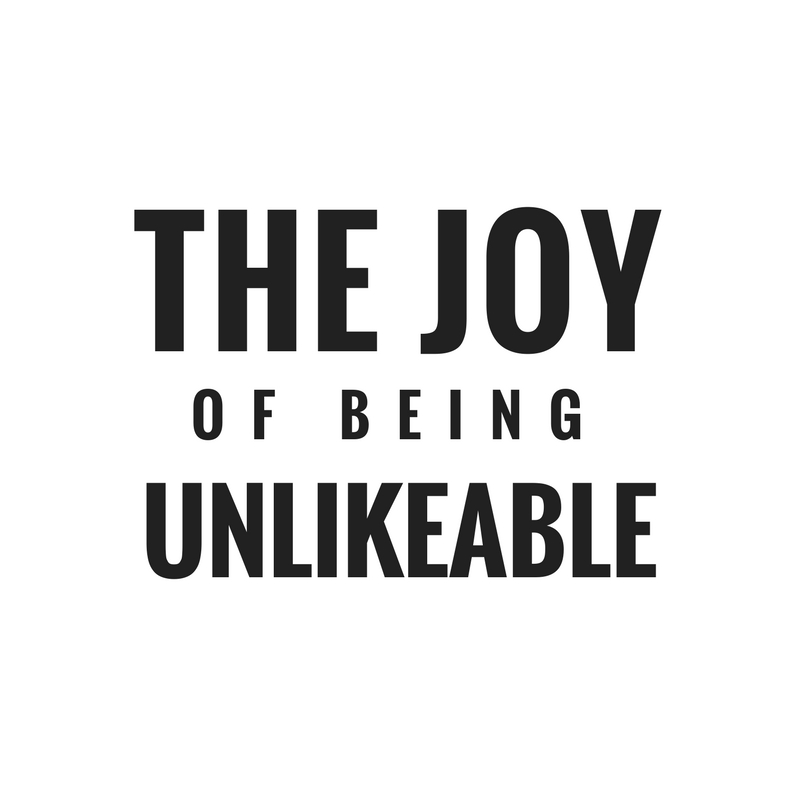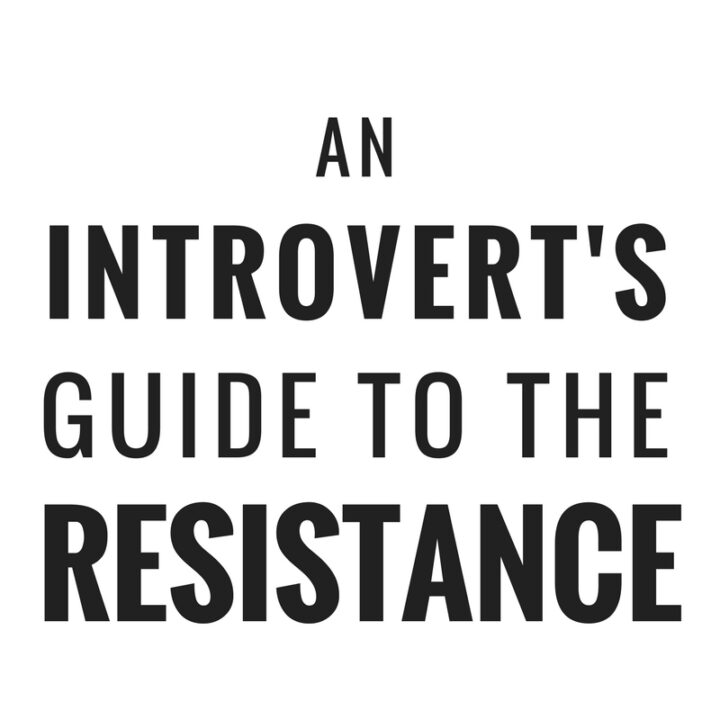This essay was originally published on Medium. I will be publishing more non-food-related essays there and though some, like this one, will make their way over here, you should follow me on Medium so you can continue to read more of my work. Thank you so much for your support!

Recently, I really ripped into a coworker in a way that was completely foreign to me. I’ve spoke before about a time when I stayed quiet while listening to his political beliefs. This time, I was not quiet. I’ll spare you the exact play-by-play, but suffice it to say that I was not having his nonsense. I was polite and kept the volume of my voice down the best I could, but by the end of it, he was speechless and my hands were trembling. I grabbed my phone from my desk and walked out of the room.
I went out on the balcony of our office building and my hands still shaking, my veins pumping with adrenaline, I called my husband, Chris. I replayed the conversation for him and then, almost breathlessly, I told him “It felt so good.” I told him how proud I was of myself and he told me he was proud of me too. After we ended the call, I paced the balcony for a few more minutes, feeling the absolute rush that comes with speaking your mind. I felt the pleasure of exhaling.
Before going back to my office, I thought “I really love this new me!” Just a week earlier, this never would’ve happened.
You see, I’m a perfectionist. I’ve spent a large chunk of my life, trying to be my version of the Ideal Woman. Of course, I never consciously called it that. I didn’t even realize that was what I was doing, but I did it by gradually building a list of expectations for myself. These expectations included: Be kind, be nice, be generous, be friendly and outgoing, be the type of person that everyone wants to be friends with, be the type of friend that remembers all the small details of each and every one of your friends, be a good gift-giver, be successful, be talented, be clever on social media, be a good daughter/granddaughter/sister/cousin/niece/step-mother/aunt/etc., be attractive, dress well, have good hair, be ambitious, be laid back, be good at small talk, be funny and witty, remember everyone’s birthdays, be smart, be brave, be non-confrontational, be gracious, be smiling, and basically just be likeable. Likeable. Liked.
Then last week, while listening to a podcast at work, a thought that was only semi-related to what I was listening to appeared. I had to press pause and remove the ear buds from my ears. I sat still and let this concept that just popped into my brain settle into all the nooks and crannies of my soul. That concept was this: This set of expectations I’d created, were, get this: never created by me at all. This Ideal Woman I’d been striving to be was not an ideal I’d dreamt up- it was created by society, or to be exact, the patriarchy. These expectations and ideals placed on women (and I should clarify here that these are just some of the expectations placed on white, cis women. Women of color and LGBQT women face these and a whole different, more extreme, set of expectations) are so ingrained into society that I didn’t even realize that I had fallen prey to them. All these years, I thought these expectations were my own.
What’s even trippier is that I was previously aware of society’s expectations of women, the construct of the Ideal Woman, and how society persecutes any woman who doesn’t fit into this mold (*cough- Hillary Clinton- cough*). I read feminist books, listen to feminist podcasts, and consider myself pretty enlightened when it comes to most things feminist. And though I know I still have more learning to do, I truly thought I was safe from it all. I thought this was different because I was a.) aware of it, b.) already empowered (or so I’d thought), and c.) thought I was living according to my own ideals. That patriarchy is one tricky bastard. I mean, this is some serious Matrix-level shit.
Once this concept settled in, a series of epiphanies hit me like rapid fire. It went something like this: If these expectations are not my own, I don’t have to live up to them. I don’t have to feel guilty for not living up to these expectations. I don’t have to smile when I don’t want to. I don’t have to apologize for being in someone’s way, for slightly inconveniencing them, for failing to meet any of these so-called expectations, for just breathing the same air as them. I don’t need to talk when I don’t want to or to people I don’t feel like talking to. Even more importantly, I don’t need to be likeable. I do need to be nice and kind and compassionate, but those traits are not intertwined with being likeable. Let me repeat, being likeable is not necessary anymore. I don’t need to be likeable.
Say that to yourself: “I don’t need to be likeable.” Say it out loud. Shout it. It feels so good.
This last month has been one of the most freeing, exhilarating, and joyous months of my life. Of course, this new “unlikeable” me is a work in progress, but so far, the transition has been pretty successful. There have been very few forced smiles. I don’t feel obliged to make small talk (a very stressful thing for me) with coworkers I don’t know very well. The words “I’m sorry” have taken a huge cutback as I become more conscious about apologizing. I try to only do it when warranted. When a man takes my equipment at the gym without asking (an occurrence that happens all too often. Women generally always ask first if I’m using something before taking it), instead of finding a replacement (my usual reaction), I now ask the man to give the equipment back to me. I don’t always move out of the way of men I pass in the hall. Now, sometimes I let them move out of the way for me. I consciously tell myself not to be ashamed of being socially anxious or awkward. And though my hands may shake, I feel more confident speaking my mind, for making my voice heard. On repeat, this mantra plays in my head: “I don’t need people to like me.”
I feel so light and free.
When a woman expresses herself publicly, she is almost always judged by the people around her, by society. They say “She’s crazy,” “She’s bossy,” “She’s emotional,” “She’s jealous,” “She’s PMSing,” “She’s a Bitch.” Our emotions are devalued, which in turn, forces us to question the validity of our emotions. I can’t tell you how many times I’ve said to myself “Well, maybe I am just being irrational? I must be PMSing.” And, as a side note, I can guarantee you that if men weren’t taught at a young age that crying or showing emotions were weak, there wouldn’t be this stigma on women expressing their emotions (*waves fist at the patriarchy*). Anyway, there’s an interesting response your mind has upon being allowed to feel and express emotions freely. When I realized that I don’t care anymore about possibly getting one of those labels placed on me, I began to feel more confident with my emotions, my opinions, my natural instincts. Allowing myself to stop worrying about these labels helped me give my emotions the value that they deserve.
The most surprising thing to happen since becoming “unlikeable,” is that I’ve actually become a nicer person. Or maybe being nice has just become more satisfying to me. Since being kind and being liked are no longer synonymous for me, my acts of kindness are more deliberate. Being nice is no longer just a filter I put on each day, infusing everything I do all day long with niceness whether I want to or not. Because showing my compassion is a choice now, I’m more aware of when I’m doing it and feel the warmth it brings my heart. I swim in that warmth. And that warmth is addictive. When I’m hungry for a fix, I look for reasons to smile, for people I can shower with kindness.
I wish I could say that the the Ideal Woman is a costume that I’ve thrown out. The truth is that it’s just stuffed in a storage container and shoved into the back of the closet. I still have work to do. In moments of shyness or nervousness, I find myself slipping back into my old self. To faux smiles and apologies. But the more time I spend being my authentic self, being whatever type of woman I feel like, other people’s opinions be damned, the more dust those old expectations gather. And my mantra grows louder in my mind: I don’t need people to like me. Being “unlikeable” is just fine by me.




Jackie of Vegan Yack Attack
LOVING THIS!!!
Erin
I'm going to reread this. Probably a few times. It's so damn important.
Annie
YES, yes, and YESSSSS!!!!!
Susan
Loved this post! <3
Dessica Albertson
I can't love this enough, thank you for sharing.
Anne Dodson
Amazing! Thank you for cracking open my hard shell of hearing this.... I do NOT need to be likable! Wow this is so profound.
Maria
Fuckin' A.
<3
Dana O
This is great! I really needed this. 🙂
Dianne
BRAVO
Annemaria Lee
Brilliant! And, thank you...never made that link before.
Laura
Thank you!
Trine Rask
I love this SO much. Thank you.
Lisa
Yes! All of this. So much of this. YESSSSS.
Terri Cole
Amen!!! I am sharing this everywhere!
Elyse Sokoloff
Love it! I'm far too attached to being liked and it drives me batty. Something I need to work on for sure. So, am I the only nosey one who wants details of what happened with your coworker?
Danielle
Such a good post! This line is so, so, so true, "Our emotions are devalued, which in turn, forces us to question the validity of our emotions." I'm a perfectionist and people-pleaser, so I can relate too much. It gets extra-complicated being a female business owner and a reserved-introvert. I'm working on it, but it's a daily battle. Thank you for sharing your story!
Rachel
I love this! Thank you for posting!
Erika
This rocked my world. I'mgiving it a go!
Connie
Love it! I'm older than you, was always the good girl, and I heard something that Gloria Steinem said years ago that really resonated. She was asked why young women aren't more angry about inequities. Her response: “They’re 20. Chances are [at that age] you haven’t been discriminated against that much in the labor force. Maybe you don’t yet have children and you haven’t experienced how unequal and difficult that is. It’s why, in a general way, women get more radical with age. And men get more conservative. People look at younger women and think if they’re not radical there’s something wrong with them. No – they just haven’t experienced the problems yet.”
I find myself (finally) speaking my mind more and more and just NOT CARING and, let me tell you, it is so liberating - just as you described!
Leah
Good one!
Mary in Maryland
I had a friend tell me years ago that I'll probably wish on my death bed that I had washed my hair more often. I laughed my head off. She said, "No, seriously, sometimes you smell a little oily." Still laughing.
Carla Nelson-Boyce
Awesome!! You just articulated all the mental processes I have been going through as well. Is the Zeitgeist for women shifting? Matrix level indeed, what a great way to describe it. Thank you for your post...you are certainly not alone in this!
meg
Ha! Perfect (even though you weren't aiming for perfection) you spot on nailed it.
Cecile
Thank you.
This is what I try to do in my own life, and even more importantly to teach my children.
Constant work in progress 🙂